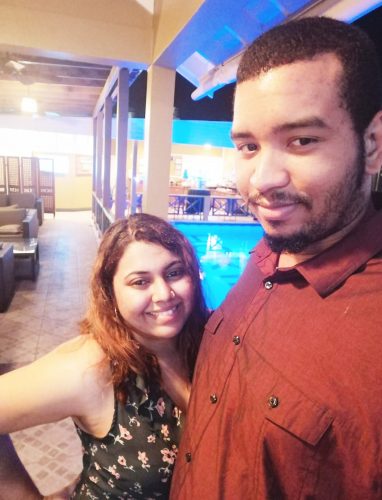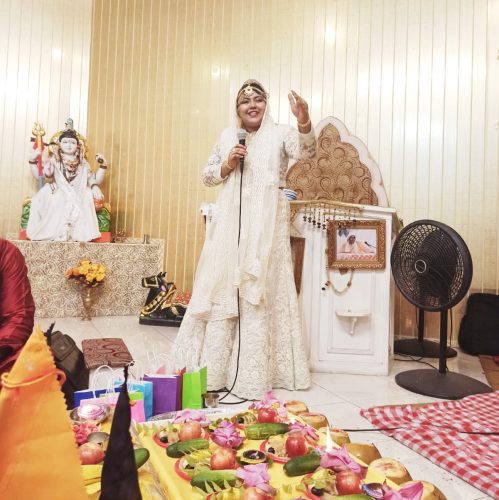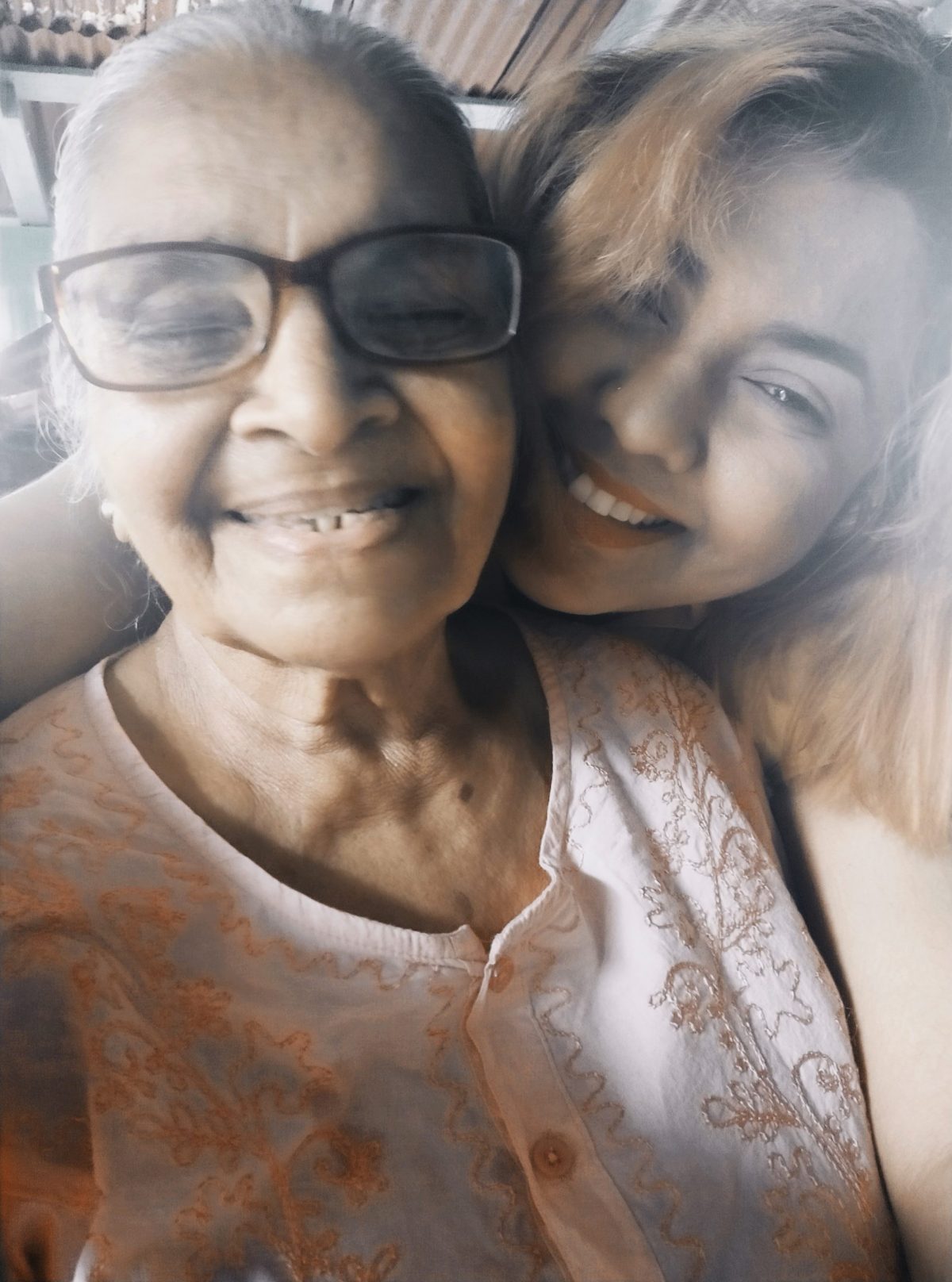Listening to her grandparents, uncles and residents in Craig, East Bank Demerara discuss the political events of the day in the family shop during her early years, Sara Bharrat, 33, learned how they took part in community life, how neighbours helped one another during the strife of the 60s, how “they made out” under Forbes Burnham, and so she developed an interest for politics.
“We had a shop at my grandmother’s house, where I heard all these stories on the sidelines about their place in Guyana’s political history. Men were always around taking their drinks and there would always be these spirited discussions on the issues of the day. That was where all my passion for politics started.”

Bharrat is the programme manager of the Guyana branch of the International Republican Institute (IRI), where her duties include managing IRI’s local programme and overseeing implementation.
The IRI is a non-partisan organisation founded in 1983 with the broad objective to help countries build their democracies.
In 2013, when the IRI had come to Guyana to do programming as part of a USAID-funded programme, Bharrat said the then government had objected to it. “As a young person I thought it was something Guyanese youths could benefit from, so I wrote a letter to Dr Roger Luncheon, then Secretary of the Presidential Secretariat calling the government out on this. Dr Luncheon and I engaged in a public debate published in Stabroek News’ letters columns. His main argument

was that it threatened Guyana’s sovereignty. I countered that it did not and that it represented a valuable opportunity for Guyanese youths to engage in political processes. We agreed to disagree in the end and the government allowed certain elements of the programme to be implemented in Guyana. That was the beginning of my relationship with the IRI.”
In 2019, the IRI was once again setting up office ahead of Guyana’s 2020 elections and invited Bharrat to work with them as its programme officer.
“I jumped at the opportunity. My entire career had been naturally progressing towards working with democracy, rights and governance.”
Her work has enabled her to interact with the major political parties, government, civil society and the private sector. “I’m not a member of any political party. I’m bipartisan. My focus is building a stronger political system in Guyana.”
She facilitates training on political campaigns, which includes budgeting to financing of campaigns, dealing with the presence of candidates, planning their messaging, targeting voters, media markets, drafting announcements, speeches and anything within that process. “I am quite happy to pass along that knowledge to anyone who is interested.”
Through the local IRI branch, Bharrat got the opportunity to be part of the intense week-long training at the Campaign School at Yale University in the US, which targets women candidates or those who work on the campaign trail in the US and around the world.
When the IRI put out a call to its employees to apply for the campaign school, Bharrat applied and was one of 12 shortlisted by the IRI for funding. However, she had to apply directly to the campaign school to be accepted on her merit. “The programme, which lasted from June 6 to June 10, was unlike any other experience I have had. The only other thing that comes close to it is the newsroom in terms of the sheer pressure that it creates.”
The programme was designed to simulate the peak of campaigns during an election period. “We were sleep deprived. I was running on 2.5 hours on average of sleep that week. We had a case study and were in groups of ten. We had classes sometimes till 2.00 am or 3.00 am the next day working on a campaign plan for an election period which we presented on the last day. My group won the best campaign plan on the democratic side.”
Bharrat also played the role of Washington State’s current senator Patty Murray. “I got positive feedback on my public speaking skills.”
While the school encourages the participants to get involved in politics, Bharrat said, cohort from IRI like herself gained knowledge and experience to share with political parties and other young people who are potential candidates or who have an interest in contesting future elections.
In 2016, Bharrat ran as an independent candidate in the local government elections to represent her constituency in Craig and lost. She said, “If I had the knowledge I now have from campaign school, I’m pretty sure I would have mashed up that election. However, my participation showed me how difficult it is for independent candidates to contest elections in Guyana.”
Through the IRI, she said, people across sectors and political parties are interested in the same issues, like strengthening the electoral processes. “Our political culture with histories of tumultuous elections and politics have left us highly suspicious and distrustful of each other. It is important for our leaders and stakeholders to get together and at some point find common ground. I truly believe in time we will find that common ground.”
Her background
Bharrat comes from a very traditional East Indian, Hindu family. Her grandfather was a cane cutter at Diamond Estate and grandmother, a seamstress and vendor at Bourda market.
Her parents separated when she was six and a half years and her brother, one year. They moved a lot during those early years between the East Coast Demerara and East Bank Demerara before renting a house in Busby Dam, Craig.
“One day, we woke up and the landlady told us to move out. My mother told us my father left with all the money. The landlady let us stay in her storeroom for a few days. I wasn’t fully aware of what was going on but I remember this intense feeling of fear and uncertainty.”
Shortly after they then went to live at Bharrat’s grandmother’s farmhouse at Craig Sideline Dam, where she spent the rest of my primary school life.
After her father left, Bharrat worked, until she was 10 or 11 years “in my uncle’s garden planting cash crops, pak choy, lettuce, bora in rain or shine from morning to noon on weekends” to help her mother. Her mother by this time had begun selling small amounts of groceries from the spare bedroom in the downstairs flat where they lived. She then built a shop in front of the farmhouse “that fed and clothed us and paid for me and my brother’s education.”
When Bharrat wrote the “Common Entrance” and was awarded a place at St Stanislaus College, her grandmother, who lived closer to the East Bank Public Road told her mother to allow Bharrat to live with her to go to school from there because it was difficult to get out on rainy mornings from the then muddy Craig Sideline Dam.
“I stayed with my nani (maternal grandmother) ever since. She is 84 and one of the reasons I continue to live in Guyana.”
During her years at Saints, she excelled at elocution and writing. At 18, after writing the GCE A’Levels, she applied to universities in the US and while awaiting their responses she applied for a position as a reporter with Stabroek News (SN) and was successful. She was at SN from 2008 to 2011.
“It was a whole new world. Those important, informative years in the media awakened me to Guyana’s realities, giving me a front seat view of our political culture. It cemented in me the value of being independent and of remaining objective when it came to looking at particular issues. As a green reporter, I showed up to work along with the early birds like the then editor. I was there during the last months of Mr David de Caires and caught the spirit of journalism that was really alive then. In SN newsroom I learnt to filter my biases, to call myself out and to ask the hard questions. When people see this ‘little girl’ walk in a room confidently and they want to know where she got this confidence, it came from Stabroek News newsroom.”
By 2011, she entered the University of Guyana to read for a bachelor of arts in English. In 2015 she graduated with a distinction and received the Dennis Irving Prize for cultural contributions to campus life.
“UG was my journey into activism. I was engaged in student life, protesting on issues that affected student life.”
Today Bharrat is the president of the University of Guyana Alumni Association. She is also pursuing a Master’s Degree in electoral policy and administration.
Without Wax
In 2013 she started writing about politics after she was shouted at when walking along Avenue of the Republic from UG bus park with her fiancé, Fabrice Williams.
“He is this big tall mixed guy of Portuguese, Amerindian, African and East Indian ancestry, a true Guyanese cook up man. A vendor shouted out, ‘Why you walking with that Black Man?’ I was shocked. This stuck with me. I could not understand why this man who I did not know, felt he had the right to shout those words to me. Fabrice, who never identified with any ethnicity, was surprised.”
Coming from a traditional PPP-supporting family, she said, “All I could have done was look at it through the lens I have, which is, my place as this younger Indian woman in this particular type of community. I felt the reason this man felt he could have spoken to me in that manner was because of the culture of the politics in our country.”
Following this incident she started a blog, ‘Without Wax’ and one of her first writings was, ‘Not because I am East Indian means I am PPP’. Without wax is rooted in art history which embodies the importance of honesty and truth.
“I wanted to make it clear that while ethnic voting was traditional in this country, we ought not to stereotype people based on race. Ethnic polarization—I don’t think we realise how much it has seeped into every institutional structure in this country. At the time I wrote with a particular intent. I haven’t written anything since last year September but it is there for public record. I said to myself, I am sharing my own perspective, doing introspection, sharing a highly personal view of my community in the hopes that it would move other young people from the other side of the coin to also share their views of politics and how it impacted on them.”
Unfortunately, she said, people with agendas picked up on her writings, misunderstood the intent behind it and used it for their own ends. “For a few years after that, people attempted to influence me one way or the other. I learned from that.”
She stopped writing for a while. “As a young person, I felt Guyana’s politics was a negative experience for me and I wanted to do nothing with the subject for a while. I knew that no matter what I had to say, people would always twist it to suit their agenda. I felt victimized. I was called ‘The anti Coolie Coolie woman’. I got all sorts of nasty messages. I heard rumours about me and I dealt with all of that as part of the growing pains of politics in Guyana.”
Until 2017, Bharrat worked on short-term contracts to earn an income.
In September 2017 she joined Conservation International (CI) Guyana as the communications lead. She understood that ‘green development’ would continue to be an issue for Guyana and the rest of the world for decades to come and she wanted to know more on the issue. “I tried to learn everything I could from mangroves, carbon credits and gold mining to our emerging oil industry, anything environmental. With all of these oil findings and our traditional earnings from other extractive industries, we looked at whether or not it is possible to extract while securing the environment. We learn that it absolutely can.”
Looking forward
Bharrat thinks she has been able to fill a unique and valuable space by being non-partisan, especially when we look at people who have cross appeal and who are trusted. “There aren’t many Guyanese who can work across differences. That is a space I have entered into and I would like to continue to carve out that space for myself. Maybe in 10 to 20 years when we are looking for leadership or for someone to mediate in important political conversations, or for someone to support or empowering youth and spreading a more positive perception of political participation in Guyana, I hope that one of the people we look to is me.”
She has not considered running for public office. “If in ten years or 20 years, I am more valuable for public office, perhaps I will consider it but for now my job is to ensure I am educating younger people who are going to lead this country to a better place.”
As a young leader, she prides herself in volunteering her time to train young leaders. She has facilitated training in communications on Project Jump Start, a 2018 Youth Ambassadors alumni initiative done in collaboration with the US Embassy in Georgetown. She is an alumnus for the Global Shapers in Guyana which stems from the World Economic Forum. She served as the vice president of Transparency Institute of Guyana Inc for a year and a half from 2015 and was also a founding member of the civil society grouping the Electoral Reform Group but resigned because of concerns over a potential conflict of interest.





